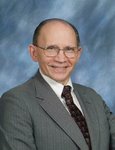By Pastor Dr. Ronnie W. Wolfe
David was a king with great power. He was the most powerful man in the world in his day. He had seen from history the building up of the nation of Israel as God's chosen people and had been a part of that great blessing. He was the receiver of great privilege given to him by God to be the king of God's great nation.
David's was the greatest earthly kingdom in beauty, strength, prestige, influence, wealth, and faithfulness to God. It is a shadow of the coming kingdom of Christ on earth, as that kingdom will be ruled through the lineage of David.
Thus, David has seen the end of all perfection, the fullness of what earthly kingdoms have to offer, the perfection, or the limit, of earth's vain glory.
But there is no end to the commandment of God, his word. One can spend endless hours, days, weeks, monthly, and years in search of the end, or the perfection, the Bible; but that will come short of an exhaustive understanding of the word, since the word of God is high and holy, perfect in every respect. It is called "the perfect law of liberty" (James 1:25).
This is not to imply that we should give up or surrender to the impossibility of completely understanding the word of God; it is, rather, that we should "Search the scriptures, . .. for they testify of me (Christ)" (John 5:39).
We as preachers are also to "Preach the word" (2 Timothy 4:2). We cannot preach the word in its perfection, but we are to reach for that perfection in our study and in our delivery. Due to our sinful state, our human limitations, and our depraved ignorance, we are limited in our knowledge; but we are to grow in the grace and the knowledge of the Lord Jesus Christ (2 Peter 3:18).
There are venues we may never see; there are maxims we may never understand; there are bits of knowledge we may never acquire; but God's revelation is perfect in its revealed form inspired by the Holy Spirit of God. We are, then, to labor in the word and doctrine (1 Timothy 5:17). Let us not be leery in our lassitude (2 Thess. 3;13) but strong in our study (2 Timothy 2:15).



No comments:
Post a Comment